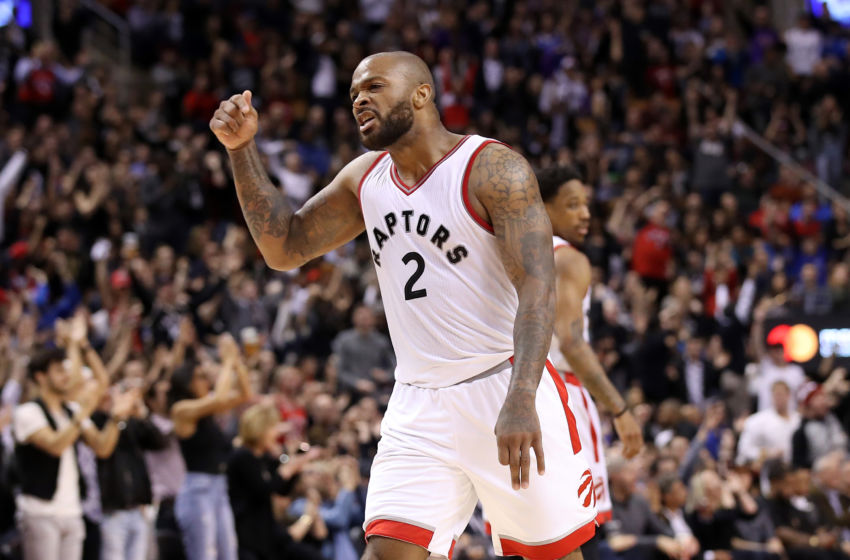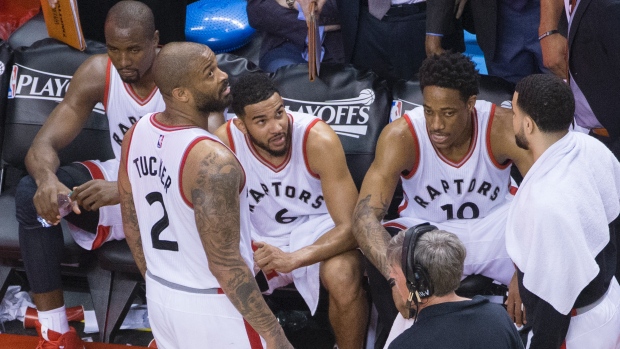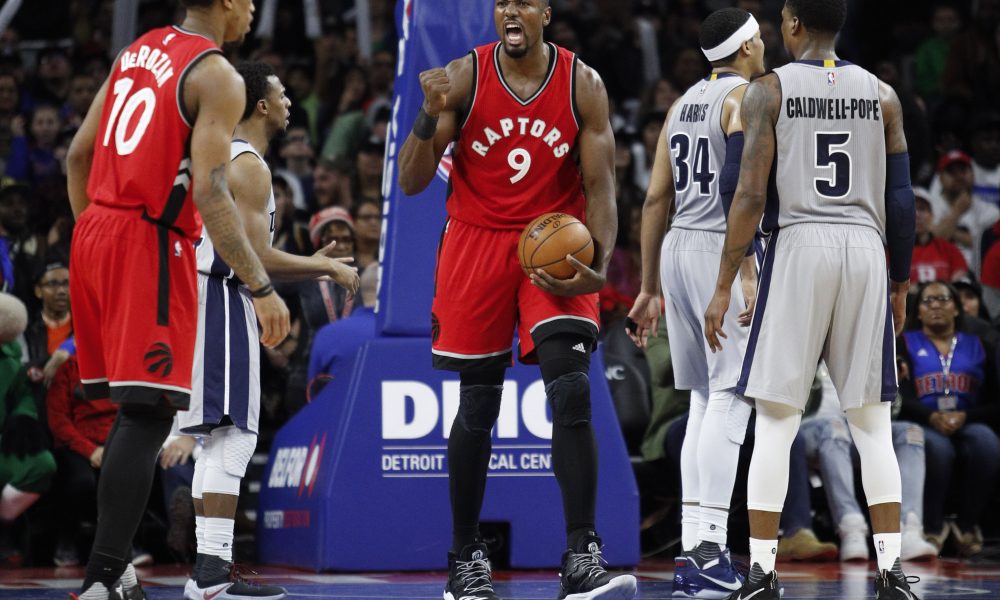P.J. Tucker hadn’t slept for 30 hours.
Arriving at Air Canada Centre after a delayed red-eye flight following a buzzer-beating announcement that he had been acquired by the Toronto Raptors for Jared Sullinger and two second-round picks, Tucker would take no suggestion – from his wife, from his agent, from precedent – that he wouldn’t be suiting up. For the first time since mid-way through his rookie season a decade prior, Tucker was a Raptors, and that meant he’d be on the court, in a Raptors uniform, at the first moment possible.
Debuting alongside fellow deadline-week acquisition Serge Ibaka, Tucker proved a much-needed jolt of life. The Raptors were to be without Kyle Lowry for most of the remainder of the regular season, and if the Raptors were to prevent a slide without their star point guard, there would have to be a new tone set at the defensive end. Tucker’s always been well-regarded for his defense – DeMar DeRozan warned of his prowess upon arrival – but it can be difficult to grasp the importance of such a skill and style until it plays out.
Tucker did not take long to force a shift in the team’s defensive attitude. A late-game strip of diminutive Boston Celtics star Isaiah Thomas helped the Raptors complete an unlikely comeback, he publicly called for better defensive effort and attention from DeRozan, and he pushed, at every turn, for greater intensity and a more pronounced focus on defensive identity up and down the roster. Tucker helped kick-start a season-saving 14-7 run without Lowry in which the Raptors would transform into one of the league’s better defensive outfits. They were not better without Lowry (nor would they be moving forward), but the co-incidence of the arrival of Ibaka, a lengthy rim protector, and Tucker, a voracious on-ball defender, helped stabilize in the wake of Lowry’s absence and helped fortify for when he returned.
Things didn’t play out exactly as everyone grew to hope over the season’s final two months. The Raptors’ offense never quite found it’s early-season groove again, the upstart Milwaukee Bucks presented a tough six-game challenge, and LeBron James seemed to take personal the suggestions (note: guilty) that this was the most open the window to topple the Cleveland Cavaliers had been since his return to Akron. Lowry was hurt again, the Raptors were summarily dispatched in four games, and the lasting image of the season became an exhausted Tucker, finally starting games, fighting with James tooth-and-nail, possession-for-possession, inch-for-inch for 46-plus minutes, a futile but admirable effort to stave off inevitability.
As the Raptors looked ahead to next year, the complicated question of whether to take a major step back or roll the core back to be competitive but unthreatening once again was a complicated one. There are tough decisions to make, and in most cases, the Raptors hold the cards. The market for Lowry appears cool, and their willingness to pay him more than most to get a deal done may soon materialize. An agreement with Ibaka has long been thought to be a matter of formality. Based on how the Raptors structured their July 1 schedule and that Patrick Patterson skipped locker clean-out day at BioSteel Centre at the conclusion of the season, it seemed clear the Raptors had also made the choice to pursue Tucker over Patterson for a scenario in which they’d retain three free agents and probably look to shed salary elsewhere. The Raptors talked up a culture reset, and while it’s always seemed more buzz-word than action plan without any significant changes to the roster or coaching staff, Tucker’s defensive force of personality would be a key to changing the team’s makeup on that side of the ball.
Late Saturday night, Shams Charania broke the news that Tucker has signed with the Houston Rockets on a four-year, $32-million deal.
According to Brian Windhorst, the Raptors came correct with a three-year, $33-million offer that would have paid the 32-year-old more salary over a shorter term. Even considering the state income tax advantage of playing in Texas, the Raptors’ offer was, in pure financial terms, better. They stepped to the table with a very competitive offer, and the $11-million annual hit suggests the team almost certainly had a salary-shedding move lined up behind it. The Raptors can’t be blamed for their efforts here.
Reading the context of the situation, Tucker opted for the situation that gives him a better chance of chasing a championship, and it’s difficult to fault him for that. He played overseas for years trying to re-establish himself, then spent years in the playoff-free Phoenix wilderness. He is fiercely competitive, and Chris Paul, the Rockets’ new point guard, is one hell of a salesman. Tucker is a natural fit in Houston, where he’ll play a lot of small-ball power forward, feast on a high volume of mostly open corner threes, and take up the assignment of the opponent’s most difficult check. He is a terrific role player, and Houston is an excellent team in great need of exactly the role Tucker plays.
The loss hurts for the Raptors, who have little means of replacing him. They could return their attention to Patterson, though the tea leaves certainly suggest that relationship has come to a conclusion. Depending on exactly where the numbers come in for Lowry and Ibaka could get use of the full $8.41-million non-taxpayer mid-level exception, which would let them get into the market for players in this same price range (C.J. Miles, who should make more than this but appears to have a very quiet market out of the gate, would be a magnificent addition). The loss of Tucker probably means that the Raptors are less committed to shedding the salary of DeMarre Carroll, or at least less motivated to attach an asset to it on the way out the door, because they need him a little more now. Shedding Jonas Valanciunas’ deal would now necessitate bringing in another power forward (it may have, anyway, given how poor a rebounding team the Raptors figure to be without him).
The Raptors should call the Rockets on a potential sign-and-trade to recoup something for Tucker. It won’t be much – any visions of Trevor Ariza or a major rotation piece should be dispelled – but Houston has a great deal of incentive to work Tucker in via trade in order to preserve their mid-level exception for other pieces (potentially split between Zhou Qi and Nene). The math isn’t easy. With maximum annual raises, Tucker’s outgoing salary would be $7.45 million, which means Houston has to send out at least $4.25 million in guaranteed salary to make the math work. They don’t have a player that fits, but they could send out the non-guaranteed deals of Shawn Long, Tim Quarterman, and Ryan Kelly, all of whom the Raptors would probably waive, and throw a pick Toronto’s way for as a thank you for making it happen. It’s not a certainty Houston would be amenable to this, or that Toronto would be, or that they can find a way for the salary matching math to work perfectly within the new collective bargaining agreement rules (it’s close, at least) and Houston’s own complicated offseason sequencing plans (a question for them). But it’s worth a call to explore.
Whatever the case, the Raptors won’t be able to fill that Tucker-sized void. It would seem strange that the entire offseason plan tilts on a player who spent a third of the year with them, but this seems like it could cause a significant shift in their approach. Lowry is the big domino that everything flows from. The delay in a deal that everyone seems to think is once again something close to inevitable suggests the Raptors may be lining up all of their pieces before committing to anything (or to present to Lowry and Ibaka, or both), and they’ll now need to shift gears.
They can play the exception market using the taxpayer mid-level, or try to squeeze in the larger non-taxpayer mid-level. They can continue to shop Carroll and Valanciunas, but they’ll need much more firm succession plans in place and may need to return a useful player (they should be less eager to pay someone to take them now). Moving Cory Joseph in a roster-balancing trade (read: a non-salary dump) might have to be explored. Norman Powell stands to be an immensely important player to the Raptors next season now, and as currently constructed, Bruno Caboclo or OG Anunoby could eventually be fighting for backup forward minutes (the Raptors also just loss one hell of a mentor for Anunoby, a potential defensive ace, which was a part of the draw in bringing Tucker back). There are options, but they’re a little thinner with a presumed piece gone.
Toronto is now left to adjust and configure a new plan for keeping this team as competitive as they were last year around the Lowry-DeRozan core, if they’re still committed to doing so. As recently as yesterday evening, Adrian Wojnarowski was reporting that the Raptors are still considering a youth movement, though that may be posturing to a degree. Tucker doesn’t shift a franchise direction, but he does call into question if the team can even sustain their level from last season. Masai Ujiri said the team had considered several different paths, and they probably have a contingency here. Losses in free agency happen. This one hurts.
Tucker is not a star, but he’s hard to replace, on the court and spiritually. Whomever they land is unlikely to have the same galvanizing presence on the team’s defence and their personality. It’s hard to see anyone else turning 24 games into a fan-favorite legacy. P.J. Tucker could defend your life decisions to your parents, P.J. Tucker could stop you from drunk-texting your ex, and so on. He’ll now be providing that impact in a very good situation in Houston, and there seems to be little the Raptors could have done about it. It sounds like it’s going to be great for him.




